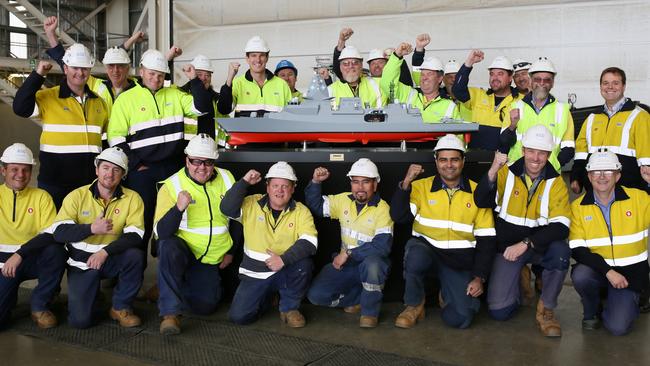Union warns there won’t be enough specialist engineers to sustain future shipbuilding program
A looming shortage of skilled workers will mean defence companies fighting to secure them, engineering unions warn.
SA News
Don't miss out on the headlines from SA News. Followed categories will be added to My News.
- October: Major deals in shipbuilding industry
- Only better paid teachers can address shortfall of future engineers
The shipbuilding industry is at great risk of cannibalising itself in the battle for skilled staff and will be forced to rely on overseas workers, unions say.
They warn defence companies will have to fight to secure employees as a national shortage of engineers bites, threatening to drive up wages and budgets.
The unions argue there won’t be enough specialists to sustain Australia’s $90 billion shipbuilding program, which is expected to create 5000 jobs in South Australia.
Professionals Australia, the union for various sectors including engineering, said the shortages would lead to skyrocketing wages and cost blowouts.
Weld Australia has warned overseas workers would have to be brought in until enough Australians were adequately trained.
Professionals Australia has told a Senate inquiry the Defence Department was losing skilled workers because of a hiring cap, which meant a heavy reliance on external consultants.
In its submission to the inquiry into Australia’s Sovereign Naval Shipbuilding Capability, it argued that there had been “peaks and troughs” in work for engineers, leading to “valleys of death” once valuable skills were lost.
“A considerable, but not insurmountable, barrier is that intellectual capital in the Department of Defence has been run down to dangerous levels after long years without bipartisan, long-term strategic policy stability, and resultant peaks and troughs in work performed by industry,” the union said.

“There is a great risk that the naval shipbuilding industry could cannibalise itself in competition for a limited pool of engineers.
“Such competition will likely result in price escalation and potential budget blowouts.”
It said the answer was a better pipeline of workers, with more cadets, graduate programs and more women.
“It’s almost 2020 and women are still only 12 per cent of the engineering workforce,” it said.
Weld Australia, in a submission to the same inquiry, warns that Australia will be forced to bring in overseas workers to fill a shortage of welding engineers in the short-term. Specialist skills are needed to work on the thick steel hulls of ships and submarines.
“There are already significant shortages of qualified welding engineers in Australia,” its submission said.
“This is anticipated to get worse as major projects come online and the demand from companies… increases.
“There is no reason why Australians cannot be developed and supported to meet all the welding requirements to service the Naval Shipbuilding Program.”
The Federal Government has established the Naval Shipbuilding College in an effort to address the issue while Defence Industry Minister Melissa Price has also encouraged the industry to do more to attract recruits.
A Defence spokesperson said they were coordinating a national response.
“Workforce planning presents significant challenges to the National Naval Shipbuilding Enterprise, due to the nature and diversity of skills required over the coming decades,” the spokesperson said.
“The Government has taken an early and active role in supporting industry to ensure they will have the skilled workforce needed to meet the significant ramp up of ship construction activity from now until a forecast steady-state peak in the mid-2020s.”

